Jim Crow 2.0 Is On The Rise As Black Republican Candidates Run For Office
Jim Crow 2.0 Thrives Even As Black Republican Candidates Gain Support

Source: MANDEL NGAN / Getty
More Black candidates running as Republicans does not negate the current disruption of American Democracy known as “Jim Crow 2.0.” Roll Call recently reported that some Black Republican candidates are raising money, which to some challenges descriptors of the current moment as a new wave of Jim Crow-like laws.
The outlet cited Wesley Hunt, a Republican running for the newly created 38ths Congressional District in Texas. According to the Texas Tribune, Hunt is running in a majority white district and has support from Congressional leadership. If Hunt is successful, he could become the third Black Republican in the House of Representatives.
As previously reported by NewsOne, research from the Donors of Color Action Network found that Americans, regardless of political affiliation, are open to diverse candidates, and that turns traditional notions of electability on its head. Black candidates running as Democrats in 2020 did better than their Republican counterparts. During a prior interview, Donors of Color Action Network Executive Director Ashinidi Maxton told NewsOne that making sure Black and other candidates of color get the necessary funding and political support is essential.
Hunt, and other conservative candidates of color, being successful at the polls doesn’t change the actions being carried out by state legislatures across the country or the refusal of Republicans in Congress to cooperate in the best interest of Black and other communities of color.
Some, including Hunt, object to the term Jim Crow 2.0, noting the challenges and struggles brought by the original iteration. Understanding the struggle and complete history of the battles fought during and after the original Jim Crow Era, it’s hard to deny the backsliding in what could otherwise be an equitable Democracy.
Except, Jim Crow 2.0 refers to a sophisticated system of policies and political approaches that stifle advancement across the board. It also does not mean that this is the same system of segregation that previously existed. The country has changed, and with the rapid diversification of the population, it can’t go back no matter how much some may want to.
Adding 2.0 to a concept is a way of indicating that it has advanced or evolved. The designation does not mean it is the same.
Banning books and undermining Democratic institutions based on false narratives and racist claims involving virtually nonexistent fraud is a revamped version of a very old strategy. While Hunt and others may feel that people aren’t incapable of getting access to voter ID, research shows that strict voter ID laws disproportionately impact Black and other people of color.
The research has been clear for years, yet Republican-majority state legislatures continue to push for the strictest versions of laws despite the lack of objective evidence of fraud or connection to improving election administration. As the Brennan Center notes, strict voter ID laws block as many as 11 percent of eligible voters.
“Many citizens find it difficult to obtain government photo IDs because the necessary documentation, such as a birth certificate, is often difficult or expensive to acquire,” read the report.
Racism, in many ways, has evolved. It’s no longer simply about skin color and what people look like but maintaining deeply ingrained systems of power and access that have persisted for generations. Restricting the ability to teach history and have complex conversations around race in public education, coupled with misinformation about a niche legal theory, is connected to predominantly white Republican-led political entities trying to hold onto power in a rapidly diversifying America.
While Hunt may be on his way to Congress, Black and Latino advocates in Texas have been fighting to address issues arising from the Senate Bill 1 passed last year. A Bloomberg Law report pointed to an analysis from the Texas Civil rights Project and Targetsmart showing the disproportionate impact of Senate Bill 1, the restrictive voting law passed last year, on Black and other voters of color. The new law targeted voting methods more heavily used in diverse areas like Harris County.,
Party affiliation has never ensured equity and just treatment for Black communities, yet Black candidates have always stepped up and thrived. Candidates like Hunt prove something that Black and other candidates of color in both parties have said for a long time. They, too, are competitive and worth the investment.
But Black candidates running in either party don’t automatically translate to improvement or advancement for Black people as a whole. That requires direct action with the intention of disrupting persisting inequities across all aspects of public life.
SEE ALSO:
GOP Candidate For Michigan State Senate Tells Group To ‘Show Up Armed’ At The Polls
















